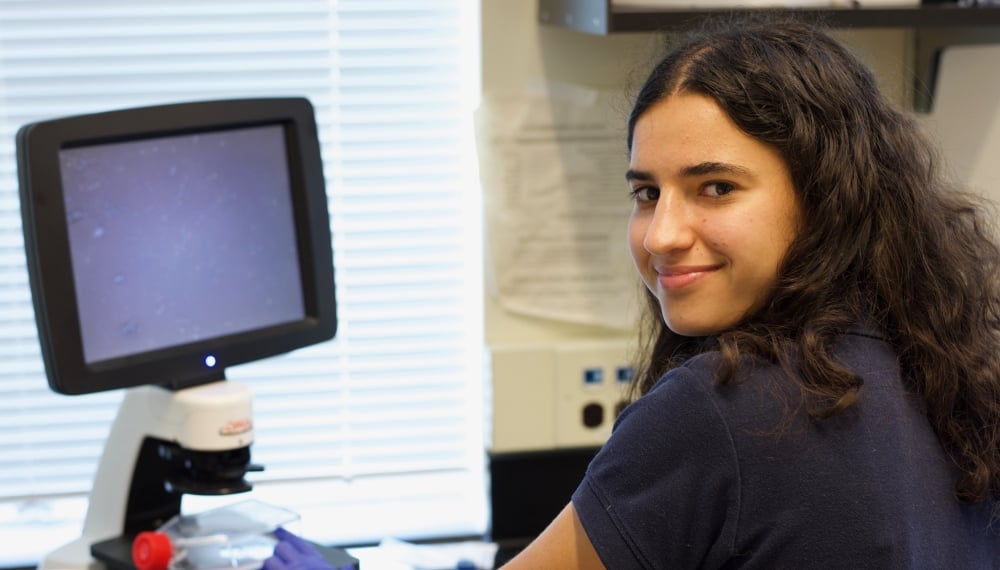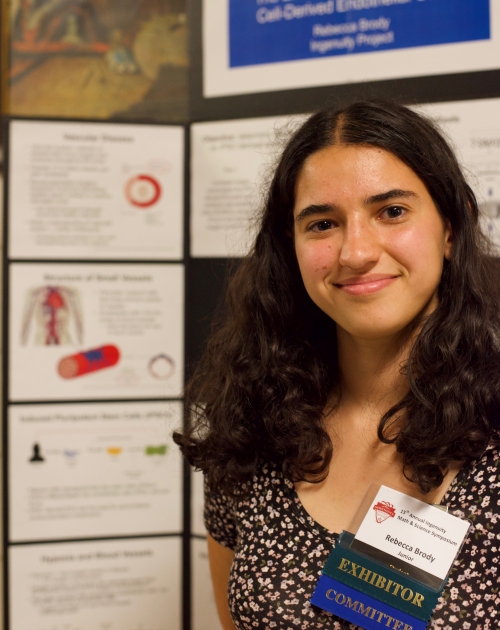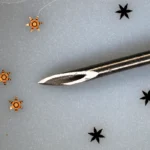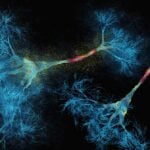Nurturing High School Scholars

Johns Hopkins University’s Institute for NanoBioTechnology has a reputation not only for conducting cutting edge research at the interface of nanoscience, engineering, and medicine, but also for nurturing the next generation of innovative leaders. That is why INBT’s diverse, multidisciplinary team of world renowned experts invite select, highly able students—some as young as high school age— to work with them as they tackle some of the most challenging problems in health care and the environment.
Rebecca Brody is one of these high school students. She is a rising senior at Baltimore Polytechnic Institute (BPI) and enrolled in the Ingenuity Project, a non-profit organization that provides high school students in the Baltimore City Public School System with accelerated curriculums in science and mathematics. Under the mentorship of Sharon Gerecht, director of INBT, Kent Gordon Croft Investment Management Faculty Scholar, and professor in the Department of Chemical and Biomolecular Engineering at Johns Hopkins University, and Gerecht’s graduate student Bria Macklin, second year PhD student majoring in chemical and biomolecular engineering, Brody performed independent research about the effects of hypoxia on stem cell derived endothelial cells. Her work has earned her regional and national recognition.
“This really gives them the opportunity to see how science is done and how dedicated one needs to be in order to be successful,” said Gerecht.
Working in a research lab while in high school provides students like Brody with many opportunities. Not only does the experience provide context for material learned in the classroom, but being in the lab also lets students observe and learn the process of scientific investigation and ethics first-hand. “This really gives them the opportunity to see how science is done and how dedicated one needs to be in order to be successful,” said Gerecht. The training INBT provides can help put students ahead of their peers and make them more desirable applicants when they continue with their education.
In her lab, Gerecht has created an environment where high school students and graduate students alike thrive. High school students working in Gerecht’s lab are paired with graduate students, who train and help them manage their research projects. In this way, graduate students play the dual role of both student and teacher. This relationship helps graduate students build their teaching and mentoring skills before they finish their college educations. High school students, in turn, benefit from the different levels of expertise that professional researchers and graduate students offer.
Macklin also advocates for collaborative relationships between high school students and graduate students at INBT. A graduate of BPI, Macklin spent a full year in Gerecht’s lab as a high school student, later returning as an undergraduate student in INBT’s Research Experience for Undergraduates (REU) summer program. Those experiences helped her decide that she wanted to pursue her PhD at INBT. “Before the program I did not have a solid understanding of what research was. I would read about research and ask, ‘Who are these researchers? What are they doing?’ The program is the best in the world. It’s the reason where I am today to get my PhD,” said Macklin.
 Beyond the research experience, the collaboration that Brody experienced working in Gerecht’s lab has made her aware of the different types of careers and variety the program offers. “It’s really great that we have this connection. There are so many great labs and people can always find what interests them. It’s a great experience,” said Brody. Lisa Fridman, Brody’s mentor at the Ingenuity Project that helps run the program at BPI, also appreciates the collaboration with INBT researchers. “Our students are fortunate to be involved in this relationship and we appreciate and respect the time given to them. This is important for the next generation of students,” said Fridman.
Beyond the research experience, the collaboration that Brody experienced working in Gerecht’s lab has made her aware of the different types of careers and variety the program offers. “It’s really great that we have this connection. There are so many great labs and people can always find what interests them. It’s a great experience,” said Brody. Lisa Fridman, Brody’s mentor at the Ingenuity Project that helps run the program at BPI, also appreciates the collaboration with INBT researchers. “Our students are fortunate to be involved in this relationship and we appreciate and respect the time given to them. This is important for the next generation of students,” said Fridman.
Brody and Macklin’s successful experiences exemplify the positive outcomes of making such collaborations with university researchers available to students of high school age. “Our research is very cutting-edge and it is very interesting to students. This program really gives them an opportunity to see how science is done and the dedication needed to be successful,” said Gerecht.
Latest Posts
-
 Johns Hopkins Postdoc Named in Forbes `30 Under 30′ List
December 8, 2025
Johns Hopkins Postdoc Named in Forbes `30 Under 30′ List
December 8, 2025
-
 Micro Grippers: David Gracias Builds Micromachines That Fold, Stick, Swim, and Sense—All Inside the Human Body.
November 20, 2025
Micro Grippers: David Gracias Builds Micromachines That Fold, Stick, Swim, and Sense—All Inside the Human Body.
November 20, 2025
-
 A bold new approach to autoimmune diseases
November 19, 2025
A bold new approach to autoimmune diseases
November 19, 2025


